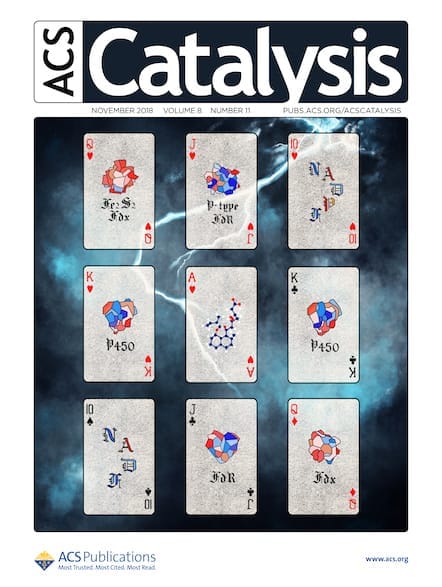ACS Catalysis and the ACS Division of Catalysis Science and Technology are pleased to recognize the collaborative work of Professors E. Charles H. Sykes and Maria Flytzani-Stephanopoulos of Tufts University for their pioneering work in developing single-atom alloy materials as catalysts. An emerging area in heterogeneous catalysis is the study of a broad class of […]

ACS Catalysis and the ACS Division of Catalysis Science and Technology are pleased to recognize the collaborative work of Professors E. Charles H. Sykes and Maria Flytzani-Stephanopoulos of Tufts University for their pioneering work in developing single-atom alloy materials as catalysts.
An emerging area in heterogeneous catalysis is the study of a broad class of catalyst materials commonly referred to as “single-atom catalysts.” In these systems, an isolated metal atom on or in a support matrix is hypothesized to be an active site for key steps in a catalytic reaction or an entire catalytic cycle. Within this broad class of catalysts, materials called “single-atom alloys” (SAAs) have recently been explored as catalysts.
The ACS Catalysis Lectureship focuses on achievements in the 7 years prior to the award, or in this year’s case, the period from 2011-2018. Of course, many of the new achievements in this period are built on prior pioneering work. The synthesis and characterization of SAAs using surface science techniques were described by Sykes in 2009 (Phys. Rev. Lett. 2009, 103, 246102). In 2012, Flytzani-Stephanopoulos and Sykes reported that isolated palladium atoms dispersed in copper activate hydrogen and catalyze efficient and selective hydrogenations of unsaturated organic molecules (Science 2012, 335, 1209). The team showed that SAA catalysts are tolerant to CO (J. Am. Chem. Soc. 2016, 138, 6396), providing a possible pathway to mitigating the poisoning that is common in many catalytic processes. In that work, synthesis of PtCu alloy nanoparticles with an atomic ratio Pt:Cu = 1:125 yielded a SAA with excellent CO tolerance in the selective hydrogenation of acetylene. The team has recently demonstrated that SAAs are effective C-H activation catalysts that exhibit tolerance to coking, a common problem in catalysis (Nat. Chem. 2018, 10, 325).
This collaboration between a surface scientist and a chemical engineer, both of whom have made numerous prior contributions to surface chemistry and catalysis, demonstrates how new discoveries emerge from the combination of complementary sets of expertise.
About the ACS Catalysis Lectureship for the Advancement of Catalytic Science
The ACS Catalysis Lectureship for the Advancement of Catalytic Science annually recognizes significant contributions by an individual or a team of researchers to the understanding and/or practice of catalysis. Since 2018, the Lectureship has been awarded on an annual cycle recognizing researchers in three traditional subdisciplines of catalysis: (i) biocatalysis and enzymology, 2018, (ii) heterogeneous catalysis, 2019, and (ii) molecular catalysis, 2020. While this rotation ensures that significant achievements in all fields will have an opportunity to be recognized, it is noteworthy that the barriers between the subfields continue to be slowly discarded as the broad field of catalysis matures. Marking the eighth year of collaboration between the journal, ACS Catalysis, and ACS Division of Catalysis Science and Technology, 2020 will see the announcement of the ninth Lectureship award, with nominations due in November 2019.
The Division and journal are pleased to honor Professors Sykes and Flytzani-Stephanopoulos in a special symposium at the 258th ACS National Meeting & Expo in San Diego, CA, in August 2019.
Past Lectureship Winners
2012 – Alan S. Goldman, Rutgers University – article
2013 – John F. Hartwig, Berkeley – article
2014 – Suljo Linic, University of Michigan – article
2015 – R. Morris Bullock, Daniel DuBois and the Pacific Northwest National Laboratory Hydrogen Catalysis Team – article
2016 – Matthias Beller, University of Rostock, Germany – article
2017 – Paul Chirik, Princeton University –article
2018 – Nicholas Turner, University of Manchester – article
